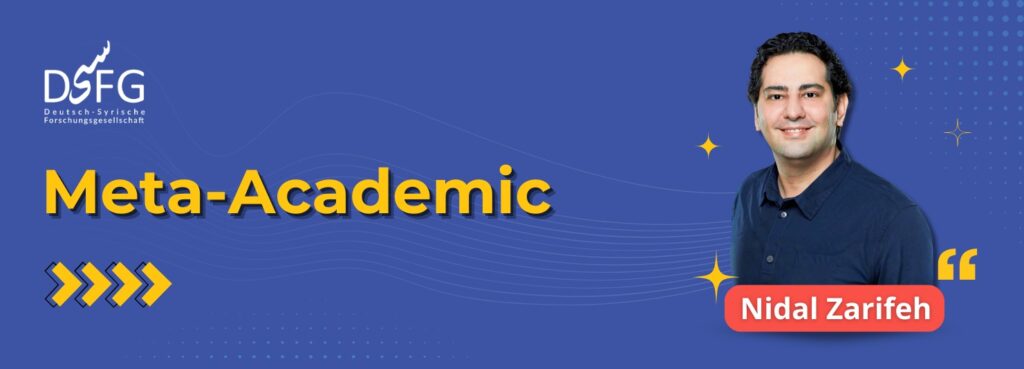A Journey of Challenge and Innovation: How Dr. Nidal Zarifa Overcame Obstacles to Become a Pioneer in Communication Research

Personal Information
Name: Dr. Nidal Zarifeh
Date of Birth: 1983
Place of Birth: Damascus, Syria
Specialization: Telecommunications Engineering
University: Dresden University, Germany
Educational Background
Dr. Nidal Zarifeh graduated from Damascus University in 2006 with a Bachelor’s degree in Electronics and Communications Engineering. He began his postgraduate studies in Syria, then moved to France, where he completed his Master’s degree at IMT Atlantique University in 2012. He later moved to Germany to pursue his PhD, graduating with honors in 2014. Since then, he has worked as a lecturer and researcher at the same university, specializing in sixth-generation (6G) telecommunications research.
Work Experience
After graduation, Dr. Nidal worked as an application engineer at Syriatel in Syria for three years. Driven by his passion for scientific research, he also trained engineering students, helping them with their graduation projects and teaching them research methodologies.
In Germany, he participated in several projects in the telecommunications field, including signal processing. One of his most significant achievements was his contribution to a number of EU-funded projects focusing on 5G research, where he helped develop international standards and co-authored a book on the subject.
At Dresden University, he continues his research on 6G technologies, focusing on various technical standards, including Terahertz technology, through a German-Japanese collaboration. Dr. Nidal was selected as the only foreign and Syrian researcher to lead projects in this field.
He also represented his university in Washington, participating in discussions and events. Although most activities usually take place in Germany, they became more limited after the COVID-19 pandemic, with last year’s events being held in Dubai.
Scientific Research
Dr. Nidal has expertise in bidirectional communications, focusing on the efficiency of information transmission and reception. He emphasized the importance of collaboration between his university and universities in the region, contributing to the formation of a strong alliance in the field of Terahertz technology.
He has participated in international conferences, including the sixth edition of a conference focused on Terahertz technologies, which was held in Dubai.
Dr. Nidal has also been part of a research team working on developing solutions for telecommunication technology challenges and exploring artificial intelligence applications for studying human-robot integration.
Positions
Dr. Nidal served as an associate researcher at the university and was previously the leader of a major 5G telecommunications project. He is also a board member and one of the founders of the Syrian Assembly Initiative in Germany, which aims to support Syrian institutions and enhance efforts to unite Syrian professionals in Germany.
In addition, he runs a blog in Arabic where he writes about technical topics, aiming to simplify science for the public.
Future Vision
Regarding his future vision and plans, Dr. Nidal expressed his desire to direct his efforts toward supporting researchers in Syria and providing both technical and scientific support, despite the challenges of balancing his university commitments and his family life in Germany.
Recently, he organized a workshop on artificial intelligence in Syria in collaboration with Damascus University. He seeks to make a positive impact in the field of academic research and to continue developing it in alignment with the needs of Syrian researchers.
Challenges
When asked about the challenges he faced during his academic journey, Dr. Nidal explained that he encountered many difficulties, particularly when attempting to pursue graduate studies at Damascus University, where he was surprised by the newly implemented admission system that was not compatible with his academic record. Competing for international scholarships was also challenging. Although he was accepted for an Erasmus scholarship, a minor accident that resulted in a broken hand prevented him from completing the scholarship procedures. He also faced difficulties due to the lack of suitable study opportunities caused by the political situation in his country. Nevertheless, he was determined to develop himself and pursue his field, using his past experiences to overcome these challenges.
Later, a French university announced a Master’s program in collaboration with Damascus University, requiring a qualifying exam, which he passed with a very good grade. He then traveled to France, where even obtaining a visa was a significant challenge.
He intended to pursue his PhD in France, but informally, one of the professors advised him that they did not prefer students of other nationalities. He was even restricted from accessing some laboratories because he was Syrian, especially since much of the research in France at the time was funded by the French Ministry of Defense during the peak of the Syrian crisis.
Later, a friend advised him to apply in Germany, where the major challenge was his lack of proficiency in the German language. He began his studies upon arrival and continued to develop his expertise from there.
Motivation
Typically, individuals working in companies receive higher salaries than those in universities, but working at a university is considered to be a value-added endeavor. Dr. Nidal enjoys sharing his knowledge and experience with students. Regarding scientific research, he believes that research does not necessarily have to achieve breakthroughs, but should instead focus on developing precise applications that promote technological justice and ensure that this technology reaches other communities.
Advice for Students
Dr. Nidal advises students to work for a period after graduation before pursuing postgraduate studies to gain experience and broaden their perspectives. He emphasizes the importance of seizing opportunities without hesitation, knowing one’s strengths and weaknesses, and continuously working on self-improvement.
He also believes that self-confidence is the foundation of success, especially for those aiming to study abroad, as it requires sufficient courage. Most importantly, if a person loves their work, they will be able to innovate and persevere.
